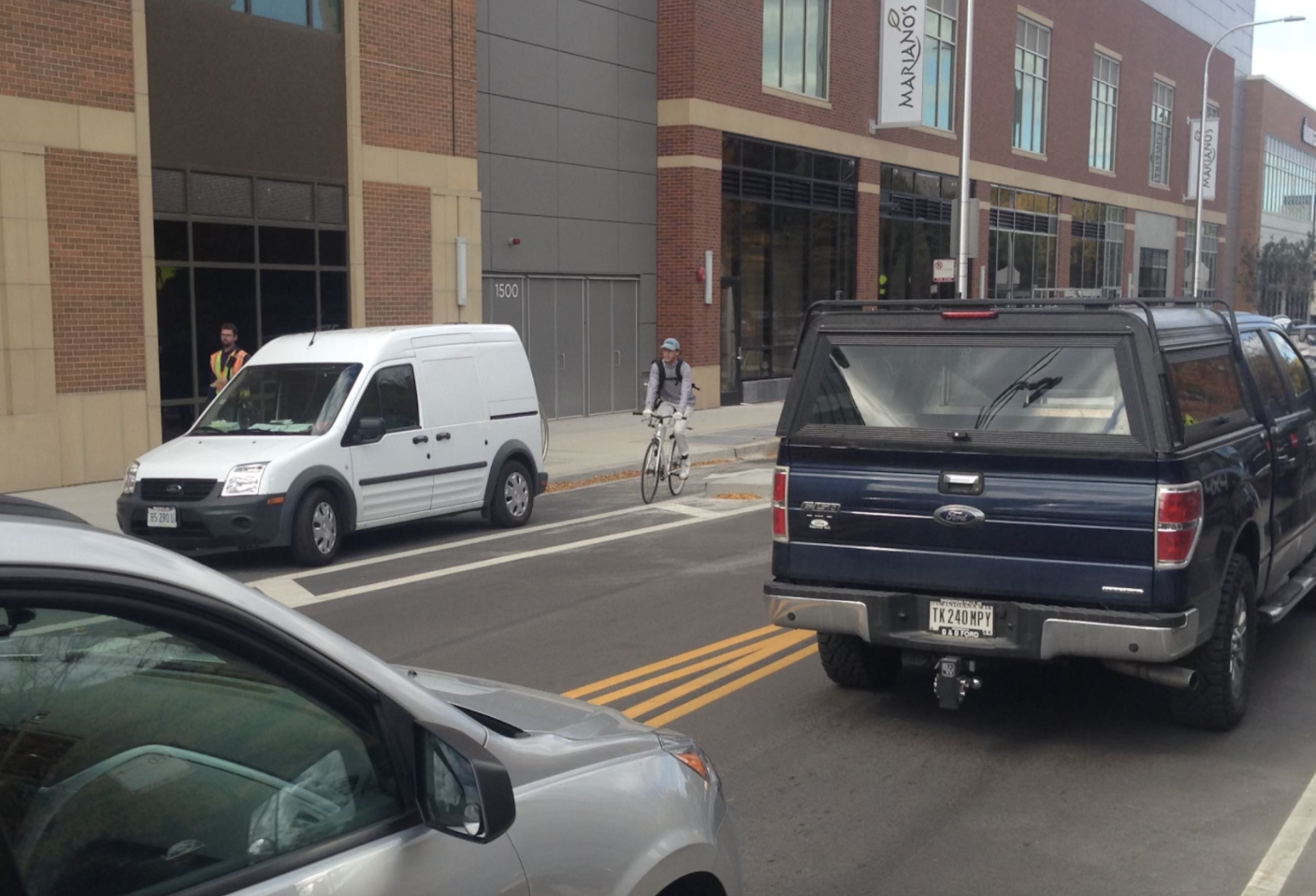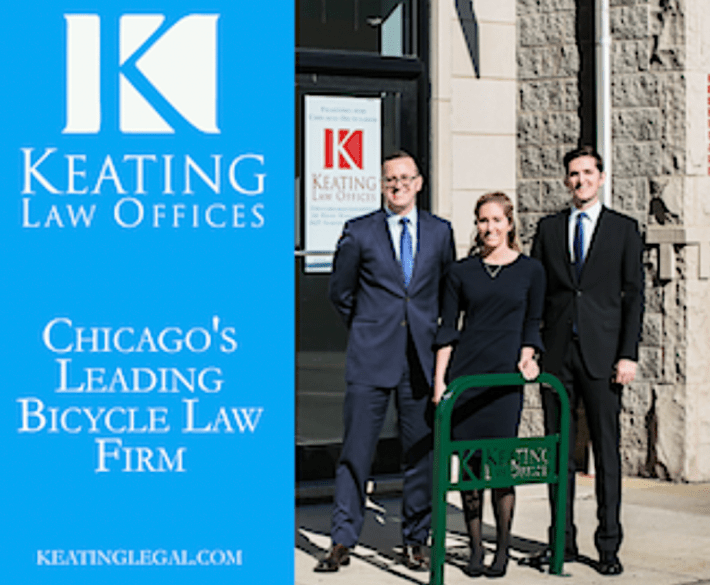
Good news! At this morning's Committee on Public Safety meeting, basically all citizens, advocates, and alderpersons who spoke voiced support for a plan to direct all 911 parking enforcement requests to the Department of Finance, rather than the police. If an ordinance passes the full City Council later this year, a pilot program could be launched as early as January.
Not only would the new policy give officers more time to focus on addressing violent crime, but it would also help create safer, more efficient conditions for all road users by helping to prevent obstructions caused by illegal parking. This would be particularly helpful for sustainable transportation users.
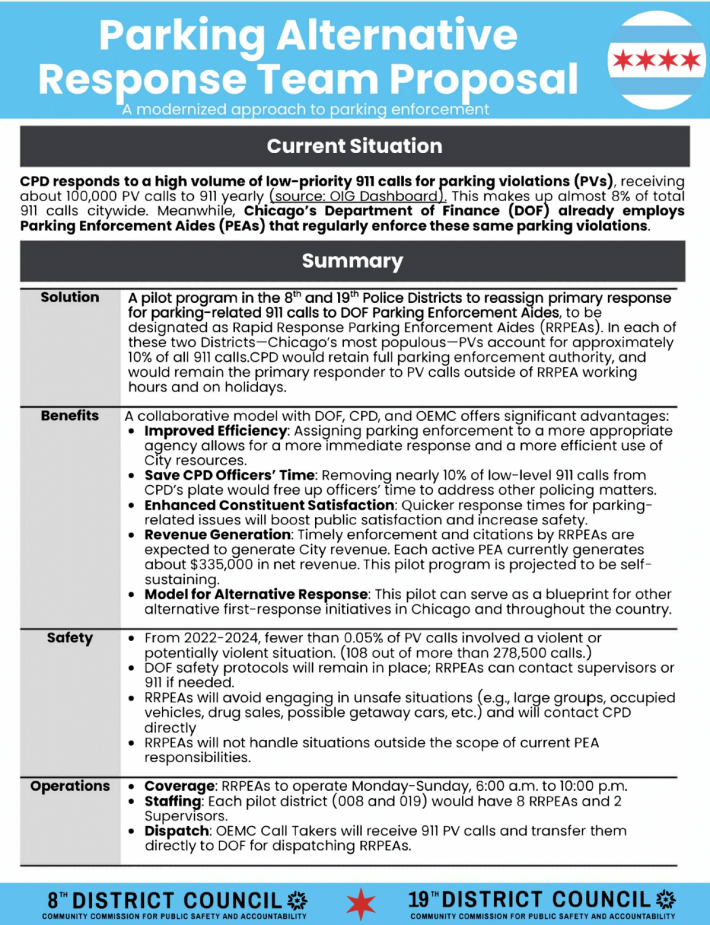
Sustainable transportation-friendly Ald. Matt Martin pitched the proposal, "Parking Alternative Response Team Proposal: A modernized approach to parking enforcement." Also presenting at the meeting were Police District Councilors for the 8th (Southwest Side) and 19th (Mid-North Lakefront) districts.
As it stands, Chicago's Office of Emergency Management and Communications sends all 911 calls about parking scofflaws to police dispatchers. Under a new pilot in these two CPD districts, the calls would instead go to Rapid Response Parking Enforcement Aides. They'd quickly be sent to the trouble spots to confirm the issue, and write a ticket if need-be. Chicago, Bike Grid Now! recently provided details about how the program would work.
RRPEAs are additional positions that will have regular patrol routes and will be monitoring for the following violations (3/4).
— Chicago, Bike Grid Now! (@bikegridnow.org) 2025-08-21T14:24:15.463Z
During the public comments, Rick Peterik, who lives in West Lakeview and has had a long career in technology and data analytics, said he volunteered his time to assist the district councilors with researching this project because he wanted to help his community. "We've dug deep into the 911, call data," he said. "And the data doesn't lie. The volume of parking calls and the amount of time that the police spend on them is significant. This is time that obviously can be used to respond to more quickly to serious crimes or to implement other initiatives that will help reduce crime."
"There are a number of cities that have implemented this approach with great success," Peterik added. "There's already a proven track record of offloading the parking violation call response from police to other groups, and they provide a road map on how to do it successfully."
Nik Hunder, a transit advocate, researcher, and environmental policy analyst, and a Chicago, Bike Grid Now! organizer, discussed some of the expected benefits of the PART proposal. "Unarmed enforcement aides are who should be actually responding to parking issues, not the cops, especially obstructions to traffic, and specifically vehicles double parked or in the bike lane," he said. "That does not require an armed officer to respond to a conflict."
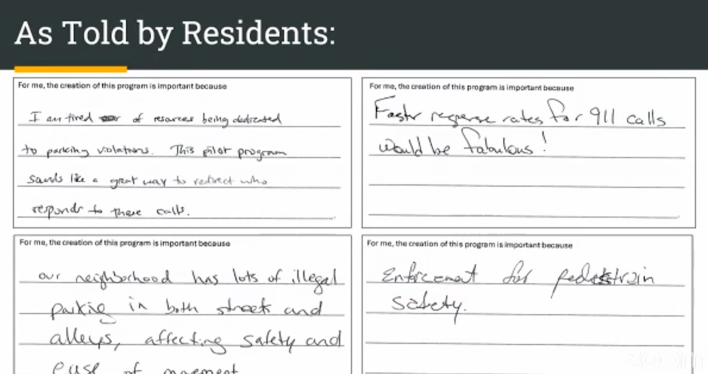
"Vehicles improperly occupying the bike lane affect all users of the roadway,' Hunder added. "Bikes have to move, which causes slowdowns to vehicles and introduces another unnecessary potential conflict if drivers do not yield the right of way."
Hunder provided some suggestions he said would make the program successful. "New parking aids should be additional positions on top," he said. "I don't want to reassign the ones that we already have. These pay for themselves. As the flyer [see above] says, every time you hire one, they generate about $335,000 for the City."
Hunder recommended increasing the fine for double parking, or parking in a bike lane when a nearby spot is available. "We know ticketing bike lane parking works. In the Safe Streets pilot, which has been running for almost a year, 70 to 82 percent of tickets issued for bike lane violations are warnings, and you don't see any repeat offenders."
Next up was the Active Transportation Alliance's Managing Director of Advocacy Jim Merrell. "When cars obstruct crosswalks, bike lanes, and bus lanes, it is more than an inconvenience," he said. "For vulnerable road users such as people walking, biking, children, seniors, and people with disabilities, these obstructions can lead to dangerous and even deadly conflicts. When our police are already asked to do so much, exploring new tools to enforce our parking laws will lead to more effective outcomes and improved public safety for everyone using our streets."
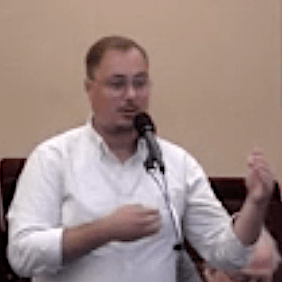
After that, Kyle Lucas from Better Streets Chicago endorsed the pilot proposal. "At a time where we're talking about acute limited resources, this is a great opportunity for us to be able to free up officer time to actually respond to violent crime and instead be approaching these other things that are maybe non-emergency, but still have dramatic negative impact on our communities," he said. "The Department of Finance already has the authority to do this. They just need additional capacity to do it."
After the public comments, Ald. Martin, one of ten alders who signed a letter to CPD, Revenue, and OEMC voicing support for the proposal, shared his feelings on the issue. "This is the sort of work that we envisioned when we passed the ordinance establishing police district councils and [Community Commission for Public Safety and Accountability], among other entities," he said.
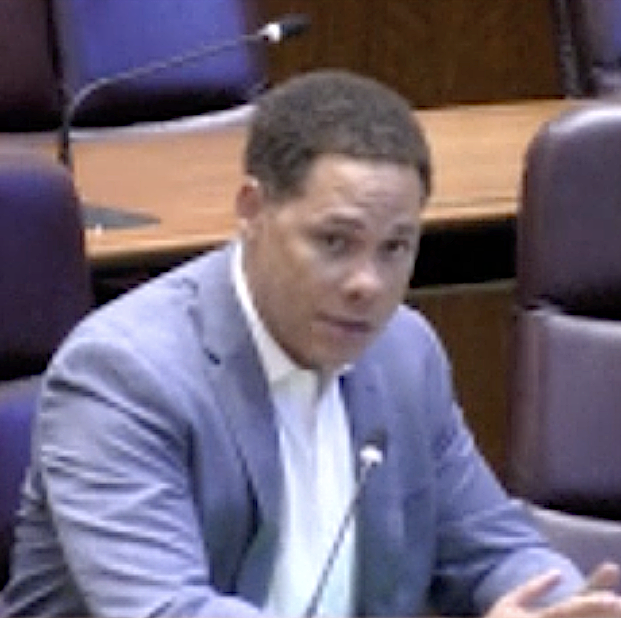
"It's fair and balanced," Martin added. "It incorporates a lot of feedback from the Department of Finance, OEMC, as well as the police department to, at bottom, ensure that when someone calls 911, about a non violent but still-urgent parking-related issues, say it is an abandoned vehicle, an illegally parked vehicle, that that gets a prompt response. We're simultaneously ensuring that we're asking our officers to focus on the most critical public safety matters, whether it's responding to calls involving shootings, carjackings, burglaries, robberies, or doing proactive policing that we know is so critical as we continue to strengthen the trust between the police department and the communities that they serve."
Martin mentioned the nine other alders who previously voiced support for the proposal: Ald. Julia Ramirez (12th), Ald. Jeylu Gutierrez (14th), Ald. Derrick Curtis (18th), Ald. Michael Rodriguez (22nd), Ald. Silvana Tabares (23rd), Ald. Andre Vasquez (40th), Ald. Timmy Knudsen (43rd), Ald. Bennett Lawson (44th), and Ald. Angela Clay (46th). "So I think that shows that we have a broad base of support geographically and otherwise."
Committee Chair Ald. Brian Hopkins clarified that it was a subject matter meeting, so no vote on the proposal would be taken during the meeting. Presumably, Ald. Martin will present an ordinance about the pilot to the committee for approval in the near future, and if it passes, it would go before the full Council for the final vote.
Next, deputy leadership from CPD, OEMC, and Finance addressed the alders with some minor requests about sharing information to make the program more effective.
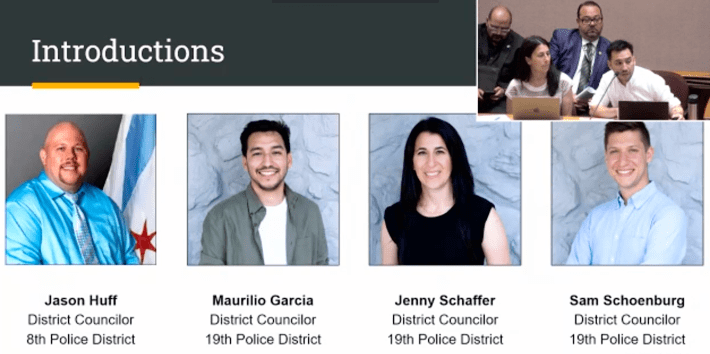
After that, there was a presentation on the research behind the proposal from some of the 8th and 19th District Councilors. "This proposal is really rooted in what we've been hearing from community members from when we really began this work in District Council," said Jenny Schaffer, a North Center resident who represents the 19th District. "Things we've heard when we've been talking with community is around the need to add more civilians to the CPD workforce, and also thinking about how to implement alternate response models to make sure that police are more visible, either on foot or on bicycles. And there's a clear desire to have 911 response times decrease, ensure beat integrity, and just bolster those interactions between officers and the communities that they serve."
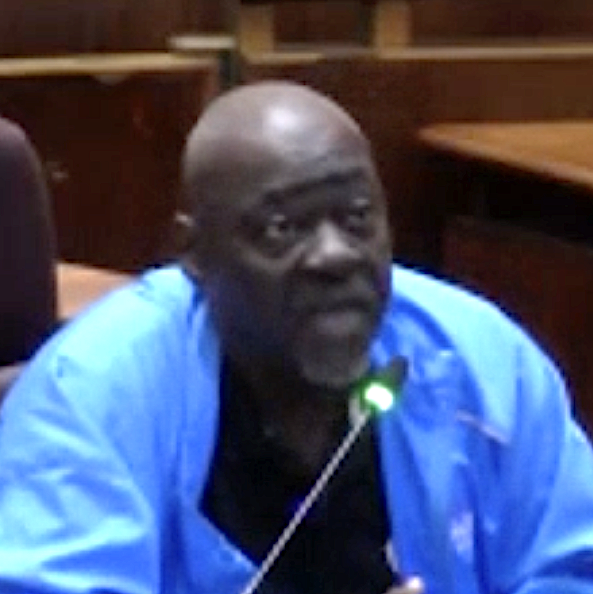
During the Q&A, several of the supporting alders voiced strong support for the proposal. "It's a no-brainer," said Ald. Curtis. "Like other wards, especially during school time, we get hit really hard with phone calls, with people blocking driveways and parking in the alleys to take the kids in school. This can alleviate all of that, while the police do their job."
Ald. Manaa-Hoppenworth noted that her ward, largely the Edgewater community, is in the top 5 percent for 911 calls for parking enforcement, so the proposal is especially relevant to her district.

"We have a concerted effort across the ward in the city to create a bike grid that connects many of us throughout our neighborhood," she said. "My ward is very condensed, very small, and yet we have a lot of [Illinois Department of Transportation] roads along with our bike lanes. She added that access to dense housing on Sheridan Road is a major issue, and there are several public and private schools in the neighborhood. "So I have a big interest for this pilot to be successful."
After the hearing, Nik Hunder from Chicago, Bike Grid Now! said he was pleased with how things went. "Today's Committee on Public Safety hearing brought out a small but diverse group of advocates, supportive residents, those who worked on the proposal, and a Police District Council member from the 17th district [which is not-included in the pilot proposal]," he said. "Feedback was overwhelmingly supportive of the proposal throughout the public comment period, the presentation given by the district councilors, and the alderperson's Q&A with the councilors. I believe many people are looking forward to the pilot in the most populous police districts to be implemented in the coming months."
Hopefully this proposal to keep Chicago's streets – especially crosswalks, bus lanes, and bikeways – clear of illegally parked vehicles, will move forward smoothly and swiftly, without hitting any roadblocks.

Do you appreciate Streetsblog Chicago's paywall-free sustainable transportation reporting and advocacy? We officially ended our 2024-25 fund drive last month, but we still need another $44K to keep the (bike) lights on in 2026. We'd appreciate any leads on potential major donors or grants. And if you haven't already, please consider making a tax-deductible donation to help us continue publishing next year. Thanks!
